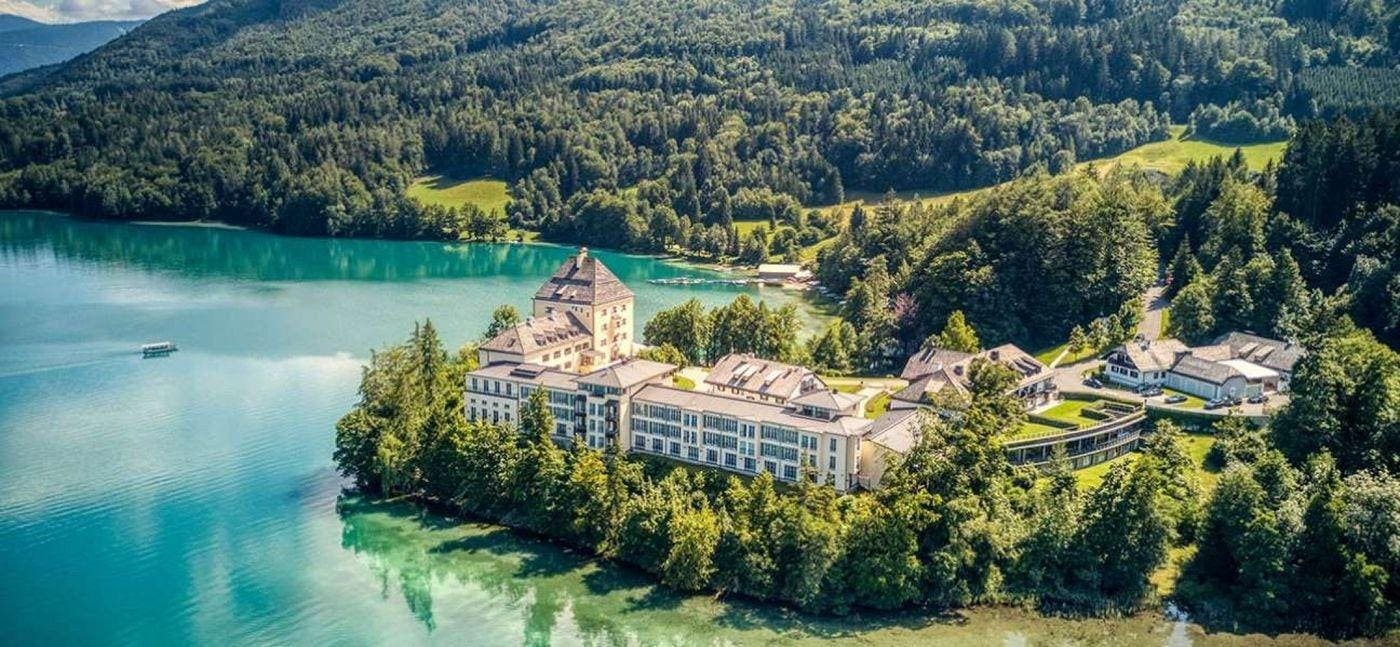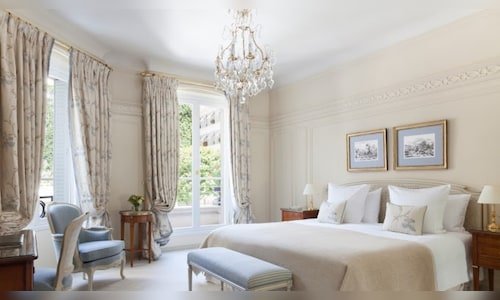Hotels & Accommodations
Best Historic Hotel Restorations in Europe: Vienna, Salzburg, Cologne

Across Europe, a handful of historic buildings—castles, water towers, city palaces—have been turned into luxury hotels. They are architectural landmarks restored with a level of care more often seen in private estates or museums than hotels.
Some are backed by big names. Others are family-owned, one-off investments. What they have in common is a refusal to flatten history into décor.
From a 19th-century water tower in Cologne to a palace on Vienna’s Ringstrasse, these three hotels show what happens when architecture isn’t adapted to hospitality—but hospitality to architecture.
The surrounding landscape and the history of Rosewood’s Schloss Fuschl are just as beautiful as the inside.
Rosewood
Once a 15th-century hunting lodge for Salzburg’s prince-archbishops, Schloss Fuschl has hosted everyone from European royalty to Romy Schneider, whose Sissi films helped cement the castle’s cinematic aura around the world.
Now, the property reopened as Rosewood Schloss Fuschl after a multi-year renovation, backed by an undisclosed investment from its owner. And the lakeside retreat near Salzburg has returned with a sharpened sense of place.
The castle was meticulously restored by the Schörghuber family—well-known patrons of the arts—and now houses what’s rumored to be Europe’s largest private art collection ever shown in a hotel. The interiors blend international polish with regional craftsmanship, pairing Austrian fabrics and restored antiques with discreet contemporary touches.
The minibar has a hand-painted scene by a local artist reflecting the scenery outside.
Rosewood Schloss Fuschl
Rosewood Schloss Fuschl brings heritage suites that mirror the tones of Alpine seasons, carpets inspired by wildflowers and Dirndls and minibars hand-painted by a local artist to echo the landscape outside.
A forest-fringed infinity pool channels old-world spa culture with contemporary restraint, while menus across its restaurants and tea salon lean heavily on regional sourcing—including honey from the estate’s own bees and fish directly from the lake out front.
The interior reminds guests of the castle’s heritage as a former hunting lodge.
Rosewood Schloss Fuschl
Guests may come for the view of Lake Fuschl, but the more lasting impression is how seamlessly history, design and landscape work together in one of the most thoughtful revivals of a historic European hotel.
How To Travel To Rosewood Schloss Fuschl
Rosewood Schloss Fuschl is 30 minutes by car from Salzburg’s city center or airport. From Munich, it’s a 2.5-hour drive; from Vienna, just under 3 hours by car or around 3.5 hours by train (via Salzburg).
The Amauris is a new luxury boutique hotel in Vienna with a rich history.
Amauris
On Vienna’s centrally located Ringstraße, most luxury hotels come with decades of hospitality pedigree and big-brand backing. There are, for example, the Ritz-Carlton, Marriott’s famous Hotel Imperial, and, most recently, the Palais Hansen by Anantara.
Next to those, The Amauris is a rare and refreshing newcomer.
Built and operated by the Breiteneder family—an Austrian dynasty known for real estate and parking garages—the hotel marks their first foray into hospitality.
The Breiteneders didn’t need outside investors, and it shows. Their neo-Renaissance Palais falls under strict landmark regulations and was restored inside and out with an obsessive eye for detail.
Nearly everything has been tailor-made, from the heavy Italian marble doors—devoid of handles and designed to swing open at the touch of a room key—to one of the last original Stigler elevator with its cast-iron cladding still in operation.
The design concept inside The Amauris uses high-end fabrics, clean lines and contemporary elegance.
Amauris
Rooms are unusually spacious for the city, and the service is quietly attentive and kind, without the stiffness often associated with five-star hospitality.
Next to the lobby, the restaurant Glasswing already draws attention from the Michelin Guide as well as locals for its ambitious, regionally grounded menu. Much of the art on the walls—both in the dining room and the cocktail bar—comes from the family’s private collection and reflects styles popular when the Palais was first built, adding a layer of intimacy and historical texture that’s hard to manufacture at scale.
The pool in the Amauris features a retractable roof.
Amauris Vienna
The small but striking spa features a sauna, steam bath, and a hydrotherapy pool in the courtyard with a retractable glass roof—ideal for stargazing in the middle of Vienna.
Everything about The Amauris feels like a legacy project—something created for the long haul.
From the outside, it still looks the same. But a boutique hotel beckons on the inside.
Wasserturm Cologne Hilton
When Cologne’s water tower began operations in 1872, it was the tallest in Europe and the industrial showpiece supplied the city with fresh drinking water until 1930.
Today, the Wasserturm Cologne still looks much the same from the outside: a tiered, cylindrical landmark just south of the old town.
Soaring ceilings and exposed brick inside Cologne’s Wasserturm Hotel lobby.
Wasserturm Cologne
But inside, it’s been reimagined as a luxury boutique hotel that respects its industrial bones—making it a natural fit for Hilton’s Curio Collection, which selects distinctive properties for their architectural integrity and strong sense of place.. The Wasserturm is currently the only Curio hotel in Germany—a fact that becomes obvious the moment you step inside.
Wassertum Cologne is a one-of-a-kind lifestyle hotel with standout design features.
Wasserturm Cologne
The lobby stuns on arrival with original steel beams, exposed brick and a spiraling black staircase rising into a 33-foot atrium bathed in moody, architectural lighting. Curved corridors above the lobby wrap around the tower’s hub, leading to guest rooms tucked into vaulted alcoves.
One of the most stunning rooms is the double-height Art Suite by local pop artist Sascha Dahl. Thirty-five original works by Dahl stretch across two levels, adding playful bursts of color and personality to the crisp, contemporary interior.
The Rooftop Bar has panoramic views of the city.
Wasserturm Cologne
Where machinery once whirred, the rooftop bar now offers 360-degree views of the city, with Cologne’s cathedral spires rising just beyond the . The drinks lean local—apple schnapps from the nearby Rhine region, cold-pressed juices and house cocktails that reflect the same clarity and understatement as the space itself.
It’s the combination of preserved industrial architecture, contemporary art and a clear connection to Cologne’s cultural life that gives the Wasserturm its staying power.
The monumental 19th-century brick rotunda once held the city’s drinking water.
Hilton Wasserturm Cologne
MORE FROM FORBES:
Hotels & Accommodations
Brigade Hotel expands footprint beyond South India, eyes religious tourism

Speaking to CNBC-TV18, Nirupa Shankar, Managing Director of Brigade Hotel Ventures, said that the company has an aggressive expansion pipeline, with five hotels already under development and more in the works.
The company is also shifting its portfolio mix toward high-end, five-star deluxe properties like Grand Hyatt (Chennai), Ritz-Carlton (Kerala), and Intercontinental (Hyderabad), which is expected to significantly boost ARR over the next five years.
While its base remains in South India, Brigade is gradually expanding into new geographies and exploring both leisure and religious tourism destinations. The firm is also scouting for opportunistic acquisitions using funds from its IPO proceeds, making it clear that its growth strategy is both long-term and diversified.
The company is optimistic about maintaining last year’s momentum in revenue and EBITDA, with 15–17% growth likely to continue in FY26.
These are edited excerpts of the interview.
Q: What is the growth outlook for the company in FY26 and FY27, and what kind of margins can we expect during this period?
A: In terms of our growth, what we have been saying is that last year, of course, now that we listed number of forward looking statements have to be limited. Last year we saw pretty good growth in terms of revenue and EBITDA. We saw a 16% to 17% growth in terms of topline and maybe another 15% in terms of EBITDA.
In the coming year, we feel that they should this year should not be any different. We feel very positive, I understand that the market is slightly volatile at the moment, and I feel that volatility is the nature of the game, and it is up to companies like us to keep our head down, work hard and stand the course and continue to deliver on good numbers.
Q: Given the pipeline that you have five new hotels that are coming in, your 1,000 keys coming in by FY28 to FY30, what is the peak revenue now that one could see coming in for the company? Overall in terms of the business wise FY25 ₹
468 crores was your revenue? Next three-four years, what would we expect?
A: The next three, four years, we will have three hotels coming in byFY28, we will have another three coming in and FY29 and the business development doesn’t stop just there. Every year we are doing business development continuously. In fact, apart from the five hotels where we have tied up the land and the brand, there are three more hotels where we have tied up the brand and the land, and that will be announced shortly.
In terms of the IPO proceeds, we have kept aside some funds to buy an unidentified asset, so it’s more of an opportunistic buy. There will be growth that we see over the next three years. Of course, with hotels, as you know, it does take time to develop, Greenfield assets can take once you finalise the design and once you finalise the land and get the approvals, they do take at least two and a half three years by the time they can open to the public. It is a long-term game when it comes to hospitality, peak revenues, like I said, by the time these hotels come up and start to stabilise, could take five years from now. Howevr, our existing portfolio will continue to see growth, and like I said, we are looking for opportunistic buys in the market as well to spur on our growth.
Q: Let us focus on geographical experience, as of now, you have a stronghold in South India. How do you see geographic breakup move from here on.
A: See our stronghold, even from the parent company, is the Southern markets. We like the markets of Bangalore, Chennai, Hyderabad. Our hotels are currently in five cities. We will be expanding to at least seven cities where we have current visibility and where we have acquired land. In the sense, expand from five to seven. Apart from that, one of the main reasons we did this IPO and sort of created our own entity for the hospitality vertical was so that we could look at markets where the parent entity doesn’t always already exist.
It could be some leisure destinations, some of the leisure destinations we are looking at could be Goa or interesting leisure destinations in the southern markets within driving distance of the major tier one cities could be religious destinations, where we can expect religious tourism to come through. We are evaluating markets apart from Southern. In India as well. But of course, a lot of the expansion will be in areas where we have a stronghold and where we understand the micro market specifically.
The portfolio will move from mostly business driven hotels to a very healthy mix of business and leisure. The other change that you can expect to see is moving more towards Five-star Deluxe hotels. We have signed up the Grand Hyatt in Chennai. It is a beachfront resort. We have signed up a Ritz-Carlton in Vaikom, Kerala, it’s an island beachfront resort. We have also signed up the Intercontinental Hotel in Hyderabad so these are all Five-star Deluxe properties. This will help increase the average room rate (ARR) of the portfolio when they come up and this will move us into more of Five-star luxury Deluxe category portfolio,
Q: Just a quick one in terms of ARR, what would your guidance be for the ARR going forward?
A: ARR for the existing portfolio is very different. But maybe, when we look at the ARR for the existing portfolio, because these are mostly stabilised hotels, then typically you don’t want to take a very high estimate. So our estimates are very conservative for the existing portfolio, could be in 9 to 10%.
But when you look at the portfolio overall and where we expect the portfolio to be four to five years when the new hotels come up, will be a significant increase. It could even mean a doubling up of the ARR based on how these hotels open and what the market conditions are at that point in time. Like I said, we are moving to lot more luxury hotels, and we do expect a significant increase in the ARR.
Hotels & Accommodations
15,052 Shares in Intercontinental Hotels Group (NYSE:IHG) Acquired by XTX Topco Ltd – MarketBeat
Hotels & Accommodations
Hospitality & Hotel Business Stock Price Jumps to Record High After 146% Revenue Jump and 235% Profit Growth in Q1FY26

On a year-to-date basis, the stock has risen by 0.66 per cent, while the three-month return stands at 24.81 per cent.
Chalet Hotels Limited witnessed a sharp rally in its share price on August 1, 2025, following the release of its robust Q1FY26 financial results. The stock surged nearly 19 per cent during early trade, touching an all-time high of Rs 1,082. This marked the company’s highest intraday gain in the past two months. By 10:57 am IST, the share price was trading at Rs 978.85, up 7.58 per cent.
The significant stock price movement was supported by Chalet Hotels’ strong operational performance in the June 2025 quarter. The company reported a 146 per cent year-on-year rise in total revenue to Rs 908.3 crore. Profit After Tax (PAT) jumped 235 per cent to Rs 203.1 crore, while EBITDA increased 150 per cent to Rs 371.1 crore.
DSIJ’s ‘multibagger Pick’ service recommends well researched multibagger stocks with High Returns potential. If this interests you, download the service details here.
Core business revenue (excluding residential operations) stood at Rs 470 crore, up 27 per cent year-on-year. Core EBITDA grew 37 per cent to Rs 210 crore, with margins expanding to 44.4 per cent. The company also achieved a 7 per cent increase in room inventory, driven by its expansion strategy. Chalet handed over 95 flats at its residential project in Koramangala, Bengaluru, further boosting revenue.
DSIJ’s ‘Multibagger Pick’ service recommends well researched multibagger stocks with High Returns potential. If this interests you, download the service details here.
In the hospitality segment, despite a decline in occupancy from 70 per cent to 66 per cent, the Average Room Rate (ARR) increased by 17 per cent to Rs 12,207. Revenue from this segment rose by 18 per cent to Rs 385.6 crore, with EBITDA rising 20 per cent to Rs 160.8 crore. RevPAR stood at Rs 8,059, up 10 per cent.
The rental and annuity segment posted strong growth, with revenue rising 106 per cent to Rs 73.2 crore and EBITDA jumping 130 per cent to Rs 60.8 crore. EBITDA margins improved significantly to 83.1 per cent.
The residential segment reported revenue of Rs 439.1 crore and EBITDA of Rs 162.8 crore, resulting in an EBITDA margin of 37.1 per cent.
The company was also recognised as a Great Place To Work® in India for the sixth consecutive time. However, a one-time reversal of deferred tax assets worth Rs 202.17 crore in Q2FY25, due to changes introduced by the Finance (No. 2) Act, 2024, had previously impacted the company’s profitability.
Despite being a Mid-Cap hospitality stock, Chalet Hotels has demonstrated consistent Quarterly Results and may attract attention from investors looking for long-term compounding or potential multibagger opportunities in the travel and real estate segments.
On a year-to-date basis, the stock has risen by 0.66 per cent, while the three-month return stands at 24.81 per cent.
Disclaimer: The article is for informational purposes only and not investment advice.
-

 Brand Stories2 weeks ago
Brand Stories2 weeks agoBloom Hotels: A Modern Vision of Hospitality Redefining Travel
-

 Brand Stories1 week ago
Brand Stories1 week agoCheQin.ai sets a new standard for hotel booking with its AI capabilities: empowering travellers to bargain, choose the best, and book with clarity.
-

 Destinations & Things To Do2 weeks ago
Destinations & Things To Do2 weeks agoUntouched Destinations: Stunning Hidden Gems You Must Visit
-

 Destinations & Things To Do1 week ago
Destinations & Things To Do1 week agoThis Hidden Beach in India Glows at Night-But Only in One Secret Season
-

 AI in Travel2 weeks ago
AI in Travel2 weeks agoAI Travel Revolution: Must-Have Guide to the Best Experience
-

 Brand Stories4 weeks ago
Brand Stories4 weeks agoVoice AI Startup ElevenLabs Plans to Add Hubs Around the World
-

 Brand Stories3 weeks ago
Brand Stories3 weeks agoHow Elon Musk’s rogue Grok chatbot became a cautionary AI tale
-

 Asia Travel Pulse4 weeks ago
Asia Travel Pulse4 weeks agoLooking For Adventure In Asia? Here Are 7 Epic Destinations You Need To Experience At Least Once – Zee News
-

 AI in Travel4 weeks ago
AI in Travel4 weeks ago‘Will AI take my job?’ A trip to a Beijing fortune-telling bar to see what lies ahead | China
-

 Brand Stories4 weeks ago
Brand Stories4 weeks agoChatGPT — the last of the great romantics




You must be logged in to post a comment Login